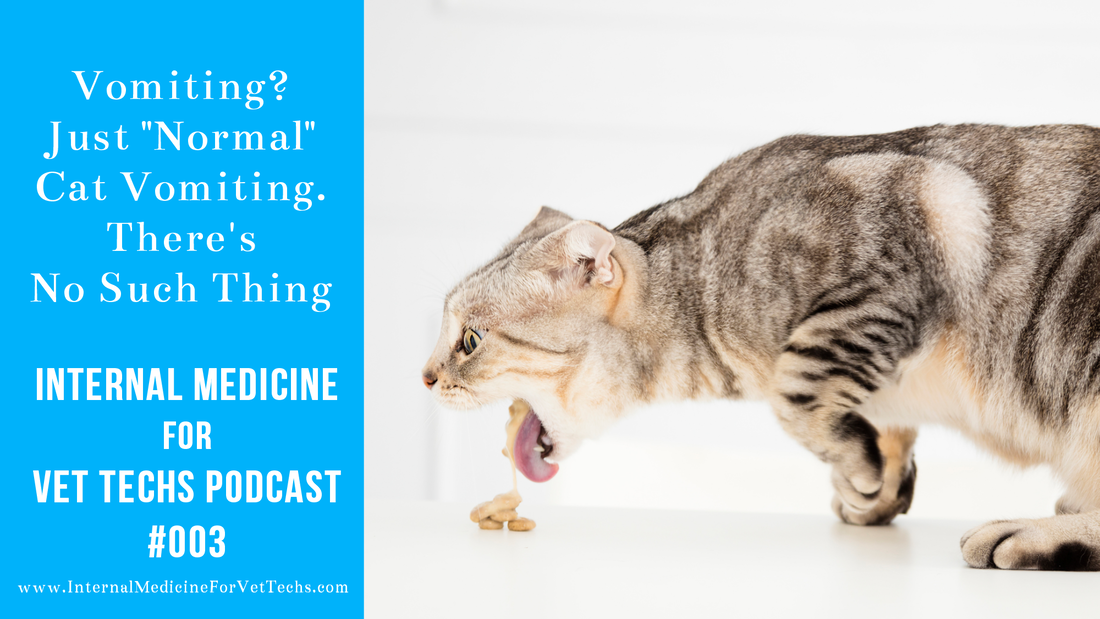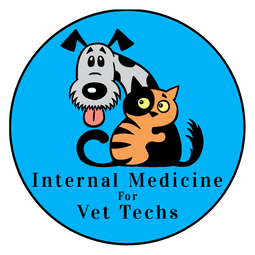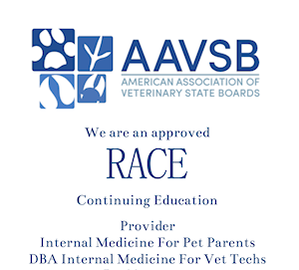|
This episode we talk about all the "normal" cat vomiting, just kidding. There is no such thing as normal cat vomiting. Why are we talking about cat vomiting you ask? Well, its National Cat Day!!
Show Notes:
In This Episode…
10/29/19: Celebrating National Cat Day with talking about “Normal Cat Vomiting”
Resources We Mentioned in the Show
Thanks so much for tuning in. Join us again next week for another episode! Listening Options
Thanks for listening! – Yvonne and Jordan 003 Vomiting? Just "Normal" Cat Vomiting. There's No Such Thing transcript powered by Sonix—the best audio to text transcription service003 Vomiting? Just "Normal" Cat Vomiting. There's No Such Thing was automatically transcribed by Sonix with the latest audio-to-text algorithms. This transcript may contain errors. Sonix is the best way to convert your audio to text in 2019. Yvonne Brandenburg, RVT, VTS SAIM: Yvonne Brandenburg, RVT, VTS SAIM: Jordan Porter, RVT, LVT VTS SAIM: Yvonne Brandenburg, RVT, VTS SAIM: Jordan Porter, RVT, LVT VTS SAIM: Yvonne Brandenburg, RVT, VTS SAIM: Jordan Porter, RVT, LVT VTS SAIM: Yvonne Brandenburg, RVT, VTS SAIM: Jordan Porter, RVT, LVT VTS SAIM: Yvonne Brandenburg, RVT, VTS SAIM: Jordan Porter, RVT, LVT VTS SAIM: Yvonne Brandenburg, RVT, VTS SAIM: Jordan Porter, RVT, LVT VTS SAIM: Yvonne Brandenburg, RVT, VTS SAIM: Jordan Porter, RVT, LVT VTS SAIM: Yvonne Brandenburg, RVT, VTS SAIM: Jordan Porter, RVT, LVT VTS SAIM: Yvonne Brandenburg, RVT, VTS SAIM: Yvonne Brandenburg, RVT, VTS SAIM: Yvonne Brandenburg, RVT, VTS SAIM: Jordan Porter, RVT, LVT VTS SAIM: Yvonne Brandenburg, RVT, VTS SAIM: Jordan Porter, RVT, LVT VTS SAIM: Yvonne Brandenburg, RVT, VTS SAIM: Jordan Porter, RVT, LVT VTS SAIM: Yvonne Brandenburg, RVT, VTS SAIM: Jordan Porter, RVT, LVT VTS SAIM: Yvonne Brandenburg, RVT, VTS SAIM: Jordan Porter, RVT, LVT VTS SAIM: Yvonne Brandenburg, RVT, VTS SAIM: Jordan Porter, RVT, LVT VTS SAIM: Yvonne Brandenburg, RVT, VTS SAIM: Jordan Porter, RVT, LVT VTS SAIM: Yvonne Brandenburg, RVT, VTS SAIM: Jordan Porter, RVT, LVT VTS SAIM: Yvonne Brandenburg, RVT, VTS SAIM: Jordan Porter, RVT, LVT VTS SAIM: Yvonne Brandenburg, RVT, VTS SAIM: Jordan Porter, RVT, LVT VTS SAIM: Yvonne Brandenburg, RVT, VTS SAIM: Jordan Porter, RVT, LVT VTS SAIM: Yvonne Brandenburg, RVT, VTS SAIM: Jordan Porter, RVT, LVT VTS SAIM: Yvonne Brandenburg, RVT, VTS SAIM: Jordan Porter, RVT, LVT VTS SAIM: Yvonne Brandenburg, RVT, VTS SAIM: Jordan Porter, RVT, LVT VTS SAIM: Yvonne Brandenburg, RVT, VTS SAIM: Jordan Porter, RVT, LVT VTS SAIM: Yvonne Brandenburg, RVT, VTS SAIM: Jordan Porter, RVT, LVT VTS SAIM: Yvonne Brandenburg, RVT, VTS SAIM: Jordan Porter, RVT, LVT VTS SAIM: Yvonne Brandenburg, RVT, VTS SAIM: Jordan Porter, RVT, LVT VTS SAIM: Yvonne Brandenburg, RVT, VTS SAIM: Jordan Porter, RVT, LVT VTS SAIM: Yvonne Brandenburg, RVT, VTS SAIM: Jordan Porter, RVT, LVT VTS SAIM: Yvonne Brandenburg, RVT, VTS SAIM: Jordan Porter, RVT, LVT VTS SAIM: Yvonne Brandenburg, RVT, VTS SAIM: Jordan Porter, RVT, LVT VTS SAIM: Yvonne Brandenburg, RVT, VTS SAIM: Jordan Porter, RVT, LVT VTS SAIM: Yvonne Brandenburg, RVT, VTS SAIM: Jordan Porter, RVT, LVT VTS SAIM: Yvonne Brandenburg, RVT, VTS SAIM: Jordan Porter, RVT, LVT VTS SAIM: Yvonne Brandenburg, RVT, VTS SAIM: Jordan Porter, RVT, LVT VTS SAIM: Yvonne Brandenburg, RVT, VTS SAIM: Jordan Porter, RVT, LVT VTS SAIM: Yvonne Brandenburg, RVT, VTS SAIM: Jordan Porter, RVT, LVT VTS SAIM: Yvonne Brandenburg, RVT, VTS SAIM: Jordan Porter, RVT, LVT VTS SAIM: Yvonne Brandenburg, RVT, VTS SAIM: Jordan Porter, RVT, LVT VTS SAIM: Yvonne Brandenburg, RVT, VTS SAIM: Jordan Porter, RVT, LVT VTS SAIM: Yvonne Brandenburg, RVT, VTS SAIM: Jordan Porter, RVT, LVT VTS SAIM: Yvonne Brandenburg, RVT, VTS SAIM: Jordan Porter, RVT, LVT VTS SAIM: Yvonne Brandenburg, RVT, VTS SAIM: Jordan Porter, RVT, LVT VTS SAIM: Yvonne Brandenburg, RVT, VTS SAIM: Jordan Porter, RVT, LVT VTS SAIM: Yvonne Brandenburg, RVT, VTS SAIM: Jordan Porter, RVT, LVT VTS SAIM: Yvonne Brandenburg, RVT, VTS SAIM: Jordan Porter, RVT, LVT VTS SAIM: Yvonne Brandenburg, RVT, VTS SAIM: Jordan Porter, RVT, LVT VTS SAIM: Yvonne Brandenburg, RVT, VTS SAIM: Jordan Porter, RVT, LVT VTS SAIM: Yvonne Brandenburg, RVT, VTS SAIM: Jordan Porter, RVT, LVT VTS SAIM: Yvonne Brandenburg, RVT, VTS SAIM: Jordan Porter, RVT, LVT VTS SAIM: Yvonne Brandenburg, RVT, VTS SAIM: Jordan Porter, RVT, LVT VTS SAIM: Yvonne Brandenburg, RVT, VTS SAIM: Jordan Porter, RVT, LVT VTS SAIM: Yvonne Brandenburg, RVT, VTS SAIM: Jordan Porter, RVT, LVT VTS SAIM: Yvonne Brandenburg, RVT, VTS SAIM: Jordan Porter, RVT, LVT VTS SAIM: Yvonne Brandenburg, RVT, VTS SAIM: Jordan Porter, RVT, LVT VTS SAIM: Yvonne Brandenburg, RVT, VTS SAIM: Jordan Porter, RVT, LVT VTS SAIM: Yvonne Brandenburg, RVT, VTS SAIM: Jordan Porter, RVT, LVT VTS SAIM: Yvonne Brandenburg, RVT, VTS SAIM: Jordan Porter, RVT, LVT VTS SAIM: Yvonne Brandenburg, RVT, VTS SAIM: Jordan Porter, RVT, LVT VTS SAIM: Yvonne Brandenburg, RVT, VTS SAIM: Jordan Porter, RVT, LVT VTS SAIM: Yvonne Brandenburg, RVT, VTS SAIM: Jordan Porter, RVT, LVT VTS SAIM: Yvonne Brandenburg, RVT, VTS SAIM: Jordan Porter, RVT, LVT VTS SAIM: Yvonne Brandenburg, RVT, VTS SAIM: Jordan Porter, RVT, LVT VTS SAIM: Yvonne Brandenburg, RVT, VTS SAIM: Jordan Porter, RVT, LVT VTS SAIM: Yvonne Brandenburg, RVT, VTS SAIM: Jordan Porter, RVT, LVT VTS SAIM: Yvonne Brandenburg, RVT, VTS SAIM: Jordan Porter, RVT, LVT VTS SAIM: Yvonne Brandenburg, RVT, VTS SAIM: Jordan Porter, RVT, LVT VTS SAIM: Yvonne Brandenburg, RVT, VTS SAIM: Jordan Porter, RVT, LVT VTS SAIM: Yvonne Brandenburg, RVT, VTS SAIM: Jordan Porter, RVT, LVT VTS SAIM: Yvonne Brandenburg, RVT, VTS SAIM: Jordan Porter, RVT, LVT VTS SAIM: Yvonne Brandenburg, RVT, VTS SAIM: Jordan Porter, RVT, LVT VTS SAIM: Yvonne Brandenburg, RVT, VTS SAIM: Jordan Porter, RVT, LVT VTS SAIM: Yvonne Brandenburg, RVT, VTS SAIM: Jordan Porter, RVT, LVT VTS SAIM: Yvonne Brandenburg, RVT, VTS SAIM: Jordan Porter, RVT, LVT VTS SAIM: Yvonne Brandenburg, RVT, VTS SAIM: Jordan Porter, RVT, LVT VTS SAIM: Yvonne Brandenburg, RVT, VTS SAIM: Jordan Porter, RVT, LVT VTS SAIM: Yvonne Brandenburg, RVT, VTS SAIM: Jordan Porter, RVT, LVT VTS SAIM: Yvonne Brandenburg, RVT, VTS SAIM: Jordan Porter, RVT, LVT VTS SAIM: Yvonne Brandenburg, RVT, VTS SAIM: Jordan Porter, RVT, LVT VTS SAIM: Yvonne Brandenburg, RVT, VTS SAIM: Jordan Porter, RVT, LVT VTS SAIM: Yvonne Brandenburg, RVT, VTS SAIM: Jordan Porter, RVT, LVT VTS SAIM: Yvonne Brandenburg, RVT, VTS SAIM: Jordan Porter, RVT, LVT VTS SAIM: Yvonne Brandenburg, RVT, VTS SAIM: Jordan Porter, RVT, LVT VTS SAIM: Yvonne Brandenburg, RVT, VTS SAIM: Jordan Porter, RVT, LVT VTS SAIM: Yvonne Brandenburg, RVT, VTS SAIM: Jordan Porter, RVT, LVT VTS SAIM: Yvonne Brandenburg, RVT, VTS SAIM: Jordan Porter, RVT, LVT VTS SAIM: Yvonne Brandenburg, RVT, VTS SAIM: Jordan Porter, RVT, LVT VTS SAIM: Yvonne Brandenburg, RVT, VTS SAIM: Jordan Porter, RVT, LVT VTS SAIM: Yvonne Brandenburg, RVT, VTS SAIM: Jordan Porter, RVT, LVT VTS SAIM: Yvonne Brandenburg, RVT, VTS SAIM: Jordan Porter, RVT, LVT VTS SAIM: Yvonne Brandenburg, RVT, VTS SAIM: Jordan Porter, RVT, LVT VTS SAIM: Yvonne Brandenburg, RVT, VTS SAIM: Jordan Porter, RVT, LVT VTS SAIM: Yvonne Brandenburg, RVT, VTS SAIM: Jordan Porter, RVT, LVT VTS SAIM: Yvonne Brandenburg, RVT, VTS SAIM: Jordan Porter, RVT, LVT VTS SAIM: Yvonne Brandenburg, RVT, VTS SAIM: Jordan Porter, RVT, LVT VTS SAIM: Yvonne Brandenburg, RVT, VTS SAIM: Jordan Porter, RVT, LVT VTS SAIM: Yvonne Brandenburg, RVT, VTS SAIM: Jordan Porter, RVT, LVT VTS SAIM: Yvonne Brandenburg, RVT, VTS SAIM: Jordan Porter, RVT, LVT VTS SAIM: Yvonne Brandenburg, RVT, VTS SAIM: Jordan Porter, RVT, LVT VTS SAIM: Yvonne Brandenburg, RVT, VTS SAIM: Jordan Porter, RVT, LVT VTS SAIM: Yvonne Brandenburg, RVT, VTS SAIM: Jordan Porter, RVT, LVT VTS SAIM: Yvonne Brandenburg, RVT, VTS SAIM: Jordan Porter, RVT, LVT VTS SAIM: Yvonne Brandenburg, RVT, VTS SAIM: Jordan Porter, RVT, LVT VTS SAIM: Yvonne Brandenburg, RVT, VTS SAIM: Jordan Porter, RVT, LVT VTS SAIM: Yvonne Brandenburg, RVT, VTS SAIM: Jordan Porter, RVT, LVT VTS SAIM: Yvonne Brandenburg, RVT, VTS SAIM: Jordan Porter, RVT, LVT VTS SAIM: Yvonne Brandenburg, RVT, VTS SAIM: Jordan Porter, RVT, LVT VTS SAIM: Yvonne Brandenburg, RVT, VTS SAIM: Jordan Porter, RVT, LVT VTS SAIM: Yvonne Brandenburg, RVT, VTS SAIM: Jordan Porter, RVT, LVT VTS SAIM: Yvonne Brandenburg, RVT, VTS SAIM: Jordan Porter, RVT, LVT VTS SAIM: Yvonne Brandenburg, RVT, VTS SAIM: Jordan Porter, RVT, LVT VTS SAIM: Yvonne Brandenburg, RVT, VTS SAIM: Jordan Porter, RVT, LVT VTS SAIM: Yvonne Brandenburg, RVT, VTS SAIM: Jordan Porter, RVT, LVT VTS SAIM: Yvonne Brandenburg, RVT, VTS SAIM: Yvonne Brandenburg, RVT, VTS SAIM: Yvonne Brandenburg, RVT, VTS SAIM: Jordan Porter, RVT, LVT VTS SAIM: Yvonne Brandenburg, RVT, VTS SAIM: Jordan Porter, RVT, LVT VTS SAIM: Yvonne Brandenburg, RVT, VTS SAIM: Jordan Porter, RVT, LVT VTS SAIM: Yvonne Brandenburg, RVT, VTS SAIM: Jordan Porter, RVT, LVT VTS SAIM: Yvonne Brandenburg, RVT, VTS SAIM: Jordan Porter, RVT, LVT VTS SAIM: Yvonne Brandenburg, RVT, VTS SAIM: Quickly and accurately convert audio to text with Sonix.Sonix uses cutting-edge artificial intelligence to convert your mp3 files to text. Thousands of researchers and podcasters use Sonix to automatically transcribe their audio files (*.mp3). Easily convert your mp3 file to text or docx to make your media content more accessible to listeners. Sonix is the best online audio transcription software in 2019—it's fast, easy, and affordable.If you are looking for a great way to convert your mp3 to text, try Sonix today. Continuing Education Certificate
Want to earn some RACE approved CE credits for listening to the podcast? You can earn between 0.5-1.0 hour of RACE approved CE credit for each podcast episode you listen to.
Join the Internal Medicine For Vet Techs Membership to earn and keep track of your continuing education hours as you get your learn on! Join now! http://internalmedicineforvettechsmembership.com/ Question of the Week
1 Comment
Amber
5/8/2024 10:04:21 am
Hi! I was trying to find the questionnaire intake y’all were mentioning on the podcast and I can’t seem to find it, also, I’m on mobile right now so I’m not sure if that makes a difference and that’s why I can’t find it. I just started listening to y’all and I appreciate all the information you’re sharing! I’ve been in GP for 5 years now and I started as an assistant moving quickly to tech assistant and moving into tech world. I had struggled a long time with mental health and wondering if this is truly a field I wanted to stay in and always deciding this is what I’m passionate about. I also felt like I wasn’t sure next steps to take on in my career and this podcast has now opened my eyes to all the possibilities I haven’t even considered. It also helps that I’m in a great, supportive clinic now that reignited that passion for me. Anyways, I’m rambling now. Thank you for all you do!
Reply
Leave a Reply. |
Looking for a specific topic? Search below to get the right episode!
Sign Up for your password for the Technician Treasure Trove! Where to ListenArchives
June 2024
Categories
All
|
Visit www.InternalMedicineForPetParents.com to learn more about us

 RSS Feed
RSS Feed

